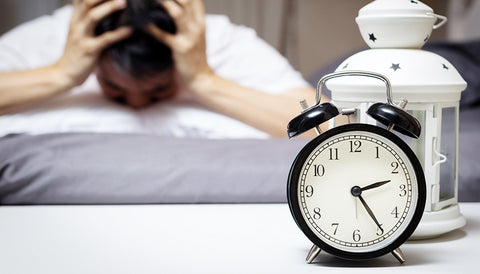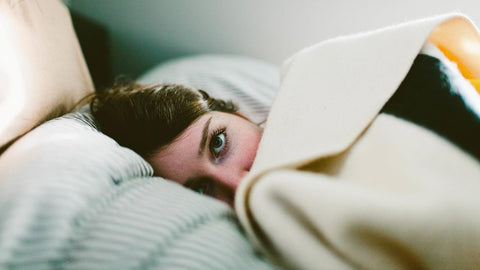8 Tips to Prevent Insomnia to Help You Get the Sleep you Need!
You try to meet all the criteria to get a proper amount of quality sleep. But, then you meet a brick wall when you have trouble falling asleep. You are not the only bleary-eyed soul who is suffering from this problem.
For some people lack of sleep is a chronic issue, with most of us having experienced occasional insomnia.
Insomnia can lead to a number of physical and mental health issues when it is a nightly occurrence. If it is only once in a while it will probably not cause too many problems.

What can occur with chronic insomnia?
- High blood pressure, heart disease, and diabetes have increased vulnerabilities.
- Getting depressed or suffering from anxiety.
- Low performance at job and schools.
- Higher risks of accidents with slow reaction time.
- Gaining weight
- Irritability
- Substance abuse.
- Weakened immune system
- Memory impairment

The functions of the brain while sleeping
It is still a scientific mystery as to what exactly happens during sleep and why it is so important to our brain.
Being sound asleep could put you in mortal danger in certain circumstances. So the question arises as to why our bodies need to be in that state for this many hours?
Sleep helps to restore and repair the brain.This is what the studies have shown. During sleep the brain decides what information it took in during the day should be forgotten and what should be remembered.
While we sleep, our brain is hard at work cleaning house, sweeping away all the waste and litter which accumulates that day. This includes beta-amyloid, a protein associated with Alzheimer’s disease which is the common cause of dementia. This is what is suggested by a paper which was published in "Science" magazine last year.
Another report which came out this summer shows sleep disorders may increase the risk of Alzheimer’s disease.
On a large sample of war veterans, a sleep study was conducted and found that those with diagnosed sleep disorders such as sleep apnea were 30 percent more likely to suffer dementia than veterans without those problems, according to researchers at the University of California in San Francisco.

Dementia and Sleep Apnea
Central sleep apnea was found to be affecting Ken Capron, who lives in Portland. The right signals to the muscles which controls his breathing are not being provided by the brain. He woke up gasping for air a total of 51 times an hour during a sleep study. His brain was oxygen deprived each time.
This kills his brain cells even if it only lasts for a second, and the loss is cumulative. Most people with sleep apnea have the obstructive kind because of something which is obstructing their upper airway, which prevents them from breathing and this results in snoring. This is frequently the tongue, moving back to contact the back of the throat.
However, there are always possible ways to cure snoring and sleep apnea by adopting little changes in your lifestyle.
Ken was diagnosed with dementia which he was told was linked to his sleep apnea about 10 years ago. He stated that he was on a business trip to Long Island but does not remember the trip down and back.
He used to read maps and used to struggle. He had four maps and was trying to figure out where he was heading to as it was really unusual. He also faced trouble in getting words out which he thought was related to a lot of Alzheimer’s and dementia-related conditions people have.
None of the recent studies about the specific role of sleep is conclusive. It is clear that quality sleep is critical for physical and mental health.

How much sleep is required?
Children and adolescents need more sleep than adults according to the National Institute of Health. Teenagers need nine hours while infants need about 16 hours a day.
Older adults need between seven and eight hours a night, about the same amount as young adults.
Heading to doctor
If it is been going on for longer than three or four weeks or if you cannot function well during the days it is probably the right time to visit the doctor as sometimes insomnia is caused by a medical condition.

Simple lifestyle changes can affect your sleep
Harvard Medical School recommends these simple lifestyle changes if there is no underlying medical cause.
IN EVENING
- Eating light dinner. Heartburn can be caused because of a heavy meal. So you need to avoid caffeinated drinks, alcohol and chocolate.
- 30 minutes before going to bed turn off the TV and all electronic devices. Take a warm bath or listen to soft music and read a book.
- Get your bedroom ready for sleep. Make sure that the temperature is cool and comfortable and cover your alarm clock so that you cannot see the time if you wake up in the middle of the night. Dim the lights and close the curtains before going to bed.
- Before bed go to the washroom.
- Going to bed at the same time every night. Leave the bedroom if you cannot fall asleep in 15 minutes, read a book for 20 minutes or until you get sleepy and sit somewhere quiet. Then get back to bed.

IN MORNING
- Even on the weekends, try getting up at the same time every morning.
- Drink a decaf or limit yourself to just one cup of caffeinated coffee at the breakfast. Too much caffeine in the morning can stay with you through the day. So, if you are used to drinking several cups of coffee a day, wean yourself off it gradually over a few weeks.
- Walk 30 minutes each day. You can sleep better as both exercise and morning sunlight can help you sleep better.
